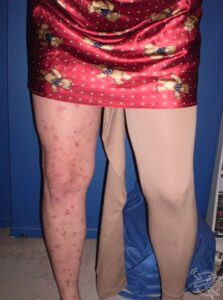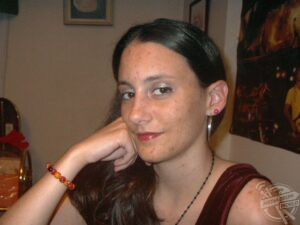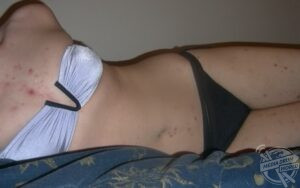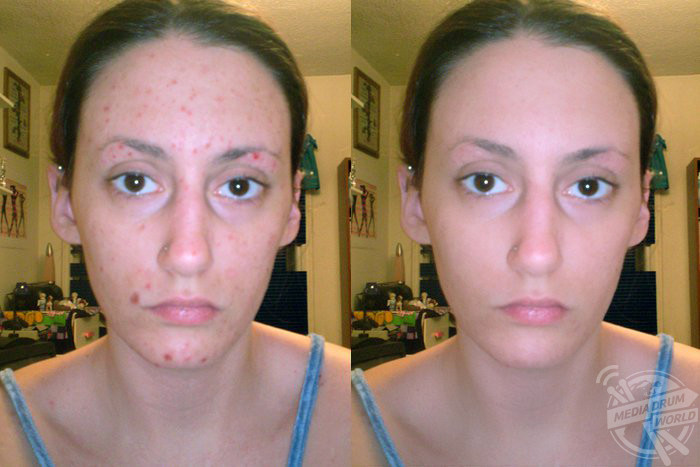By Shannine O’Neill
**EXCLUSIVE**
THIS MUM was left traumatised after medics insisted she had GONORRHOEA when they confused her compulsive skin picking with a sexually transmitted disease.
Disabled Author and Mental Health Advocate Angela Hartlin (36) from Nova Scotia, Canada, has suffered from a severe skin picking compulsion, which was accelerated by the age of 13 because of anxiety in part due to her father being left mentally and physically impaired due to a blood clot to his brain.
Since then, mum-of-one Angela, has always suffered from excoriation disorder, also known as skin picking, which leaves her with the compulsive need to pick at her skin constantly, leaving her with torn skin and open wounds.
Because of her skin picking compulsion, Angela has struggled to feel comfortable with her own body, as she constantly felt as though she needed to cover herself up when she was younger so no one would see and comment on the wounds and scars over her body that she had caused herself to have.
A traumatising experience Angela had in relation to her skin picking was when she was in skin picking recovery, an ER doctor was convinced that she had gonorrhoea because she had a slightly open wound beside her bikini line.
After explaining to the doctor that she was happily married and gonorrhoea could not have been the case, the doctor still made the assumption that she had indulged in risky sexual behaviour that resulted in a Sexually Transmitted Infection, which was in fact was later diagnosed as a twisting fibroid.
This was just one of the times that Angela had received vile or hateful comments about her skin picking, as she occasionally receives hate comments when posting on social media, but doesn’t let it get her down.
“I think it’s expected that when you put your image online and you look (or are) different, people will make negative remarks about your appearance,” she said.
“They don’t deter me from continuing my 15-plus years of advocacy because sharing hope for recovery to those who need it outweighs the cons of receiving occasional ignorant comments in passing.
“While in skin picking recovery, an ER doctor once thought that what I learned months later was a twisting thyroid, was gonorrhoea because of one slightly open spot on my bikini line.

“Despite explaining that I’m married, he made an assessment that included the realm of possibility that I engaged in risky sex or was drug-seeking instead of simply desperate for help.”
This was unfortunately not the only time that Angela had experienced unpleasant, and even dangerous reactions from healthcare professionals because of her skin picking.
Angela was denied help by another doctor for an infection on her chin, because he felt as though she deserved it because it was her fault that she had picked at her skin, causing the open wound to get infected.
As disgusted as Angela has been about the treatment she has received from her physical ailments, the mental toll it has taken on her has been immense.
From having to wait in ridiculously long waiting lists to be seen by a healthcare professional, to not even being believed when she is finally able to see a health worker, she has experienced mental health issues that have left her feeling even worse about her condition.
One of the reasons that many medical professionals did not take Angela as seriously as they should have was because there was no real diagnosis for skin picking until May 2013, when it was categorised as excoriation disorder in the fifth Diagnostic and Statistical Manual of Mental Disorders (DSM-5).
Before this inclusion, it was categorised as many different disorders, such as dermatillomania, psychogenic or neurotic excoriation, and compulsive, chronic, self-injurious, or pathological skin picking, but never had its own diagnosis until 2013.
Because of this, for most of Angela’s life, she was disregarded by healthcare professionals and made to feel as though she was to blame for everything that happened to her because of her picking.
After going through 12 intensive weeks of Cognitive Behavioural Therapy and Acceptance and Commitment Therapy with licensed therapist and BFRB expert Karen Pickett, Angela and Karen wrote a book seeking publication called ‘Embracing Dermatillomania: Through Pain and Recovery’, detailing the step by step recovery process that Angela took.
Because of all she has learned through therapy, Angela has been able to use her knowledge to get through her skin picking recovery.
“I’ve always picked at scabs, scrapes, etc, but it definitely became a problem by the fifth grade,” she said.

“In being teased, I wore turtlenecks to hide the marks on my upper chest and back while attempting to cover my forehead with bangs.
“That same year, my father had a blood clot to his brain that left him mentally and physically impaired.
“The stress and anxiety from that upheaval in my life further fuelled my picking, and it accelerated in severity by the time I was 13.”
Stress is a huge factor that has affected Angela’s condition, meaning in times of extreme stress, she is still susceptible to flare-ups.
“Eight years later, I do experience flare-ups, but have learned how to manage most of them,” she said.
“I don’t have hours-long ‘pick-sessions’ anymore, though I still get triggered by something on my skin I feel shouldn’t be there, or I may be feeling a certain way that prompts my hands to wander in search of something.
“Though they’re reduced in intensity, the obsession and problematic thoughts toward my skin never went away but I work through most urges using the tools I learned in therapy.
“Unfortunately I’ve been disabled for the last ten and-a-half years, with chronic pain disorders deeply affecting my urges.”
Angela has struggled with other serious health implications, which have made her skin picking more tempting and frequent at times because of stress.
“After a fall in 2012, my left piriformis muscle crushed my sciatic nerve, which ultimately took six years to resolve with a trip to the USA to have the muscle removed in 2018. The compensation of dragging my left leg around with piriformis syndrome for so long caused my right labrum to tear,” she said.
“During the investigations into the source of my pain, no one thought to check my hips for a pre-existing condition until 2019 when I learned I was likely born with, or developed, Femoroacetabular Impingement (FAI) in childhood.
“I’ve been on rotations of long waiting lists of over two years, which has led to 10.5 years of disability. After getting hip surgery in November 2021, it was a failure that my surgeon has kept dismissing as a success.
“After paying out of pocket for the MRI and receiving a copy of my report, my hip has a large capsular defect, and I’m back to waiting for a new surgeon to clear up this discrepancy.”

Angela has released a memoir in December 2009 about the struggles of living with a skin picking disorder, and goes through all that she had to overcome.
“My memoir, FOREVER MARKED: A Dermatillomania Diary, was released in December of 2009,” she said.
“It delves into the hardships I faced at 19 because of my picking and appearance, with issues such as depression, dating, and learning how to accept myself despite not being in recovery when it was released.”
Angela and her husband had a baby girl the month before the first COVID-19 lockdown, and hopes that she will get the right help so that she will be a better mother for her daughter.
“The month before the first lockdown, my husband and I became proud parents to our one and only little girl who brings us more joy than we could have ever imagined,” she said.
“My focus is doing what I can to get the healthcare I’ve desperately needed for years so I can be the wife, mom, and person I want to be.
“Whatever you’re going through right now, you are not alone.
“Even if you don’t have access to treatment for any health condition, get involved with an online community to share your story, feel understood, and support others who understand.
“If you suffer from compulsive skin picking, please visit Skin Picking Support for more information.”
ENDS










